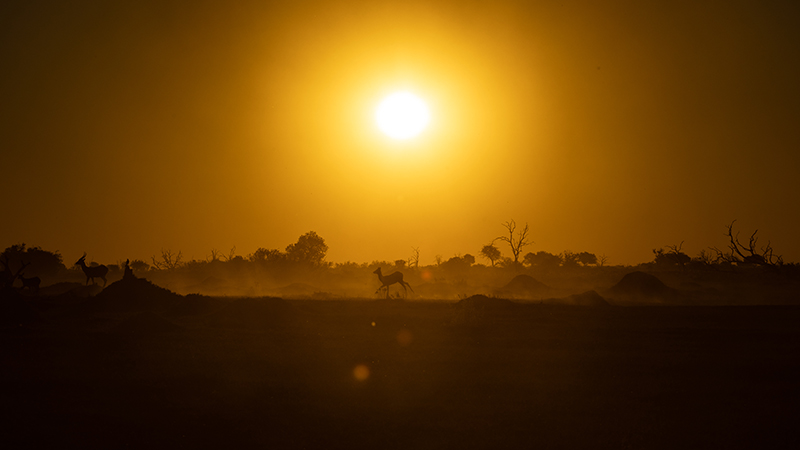Posted: 10/14/2024
The Depth of the Delta
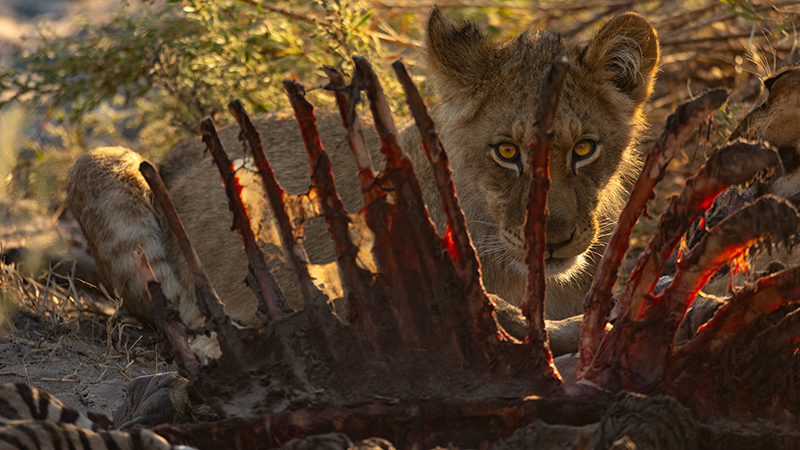
By Caden Connelly
The white minibus pulled into the crowded bus rank as the afternoon sun glared overhead. My face pressed against the window, I tried to take in all the sights of this new found metropolis. The "bus rank" or what Americans would refer to as a bus station, sat surrounded by shopping malls and streetside shacks where people sold goods or gathered to play pool. Along the rows of loading zones people sat and socialized or waited for their bus to arrive. There was no set time table, yet the bus companies, often owned and operated by a driver with just one bus in his fleet, seemed to stick to a repetitive schedule. No two buses were the same. Parked in front of our vehicle sat a well painted charter bus, purple velvet curtains protecting from the sun as it glared through dust covered windows. To our right, a rusted silver minivan with aftermarket rows of seating, trying to fit as many passengers as possible. Children sat on laps and families pressed themselves together in a single row. I rode into town in a vehicle that was a little more like the latter. With my knees pressed to the seat in front of me, I sat shoulder to shoulder with the stranger, impatiently waiting for my turn to get off. The bus smelled of fried foods as people began to unwrap their long awaited lunch. I couldn’t help but to stare, out of hunger and curiosity, as I watched the family next to me rip open a package of Saran wrapped chicken. The constant thump of Afrobeats played over the bus's stereo system as we jockeyed for a parking space. Walking among the buses, women carried baskets selling fruit, food, or clothing. Families ran across the bus rank with overflowing grocery bags and men in flip flops lugged 40-pound sacks of maize meal on their shoulders. I stepped off the bus, grabbed my two backpacks from the trunk and worked my way through the crowd. I had spent the previous month exploring the neighboring country of Namibia and the last six days at a research camp in Ghanzi, Botswana. The busy crowds and boisterous conversations had become familiar, but I couldn’t wait for the solitude offered only by an extended stay in the bush, away from any hope of cell service or cement.
As I removed my down jacket and attempted to stuff it into my overfilled backpack, a young woman approached and introduced herself to me. Her name was Glory, she worked for Okwa Sarefo, the guide and owner of the safari company I would spend the next two weeks exploring the Okavango Delta with. The employee slated to meet me at the bus rank upon my arrival, Glory wore a green cap and a white crew neck sweater. Her face lit up with a genuinely kind smile as she helped me collect my bags. We found a shaded area to sit and wait for Okwa, who would drive me to the guest house. Glory, who had just started working for Okwa, checked her phone nervously, waiting for him to arrive. To pass the time, we talked about her experience as a new member on the staff. I learned she was scheduled to join us for our two weeks in the bush. Growing up in Botswana's capital city of Gaborone, she had little experience outside of the city. Okwa hoped she could use this trip to learn what his safari company, Okavango Walking Safaris had to offer, and to help her better serve future customers. Both of us, not knowing what to expect of our time in the bush, laughed about the possibilities. Before long she pointed through the crowded stalls of the bus rank and said, relieved, "There’s Okwa." Weaving between the cars was a man whose stature and style were nearly identical to my father's. Standing no more than five foot and seven inches, he wore a stocking hat and sunglasses, a black quarter zip and grey cargo pants. He looked almost out of place in his outdoor gear and heavy boots, starkly contrasted by groups of people wearing flip flops and brightly colored shorts as they navigated the city. Around him tiny Honda taxis honked and swerved, picking up handfuls of customers in the afternoon sun. When he spotted us, he adjusted his course across the lot and extended a firm handshake. I had heard stories about Okwa over the past two years. Regarded as a legend by everyone I talked to, I was both intimidated and excited to spend the next two weeks exploring the Delta with him. Following a brief introduction, we loaded my bags into a beautiful grey Land Cruiser and set off towards the guest house.
Without a roof or doors, the wind whipped through my hair and we had to raise our voices to hold a conversation. Okwa asked me about my life in Nebraska, my academic career and if I had aspirations for the future. I asked about his history, his new business and what made him so passionate about the Okavango. He listened intently and spoke about our connections with a demeanor that put me at ease. It seemed as if every syllable was hand selected to have the most impact in his dialogue. After a half hour we arrived at the guest house where I offloaded my bags and prepared for the two weeks ahead.
The Okavango Delta is one of the world's most renowned ecological destinations. This inland delta is known for its vast array of wildlife, endless waterways, and pristine wilderness-all in the heart of the Kalahari Desert. Also considered the birthplace of humanity, this region has some of the earliest evidence of homo sapiens.
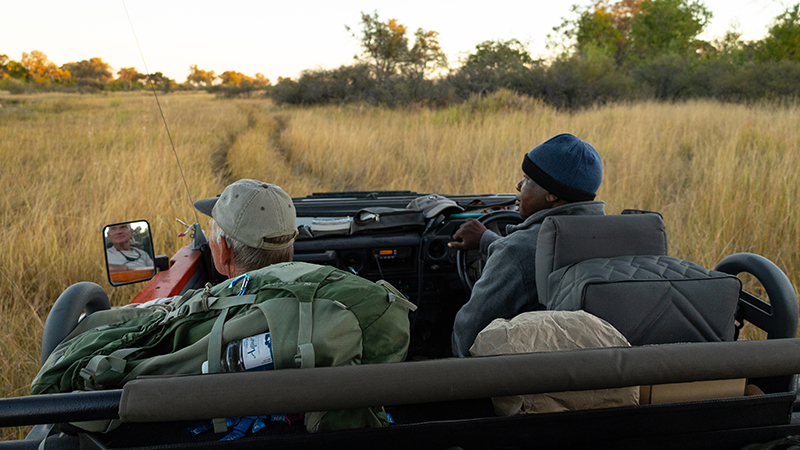
As a child I had seen documentaries exploring this aquatic crown jewel, where elephants swim amongst water lilies and herds of lechwe bound across marshy flats, horns spiraling into the sunset. One of the greatest ecosystems Africa has to offer, the Okavango Delta has called to ecologists and anthropologists for years. In just a day I would be setting foot in the landscape, with a team of University of Nebraska faculty and alumni, exploring the legend of a place that had shaped my idea of adventure. The Delta was home to Okwa Sarefo, safari guide, instructor and friend of John Carroll. John, the engineer behind this endeavor, was extremely excited for his first trip into the Delta . We had spent the previous six months preparing for this two-week safari with Okwa's company, Okavango Walking Safaris.
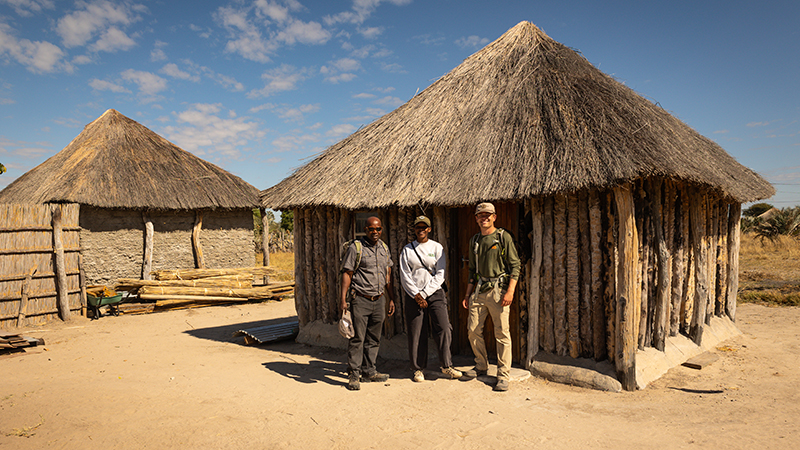
The next morning came quickly, I woke before sunrise and sat in the guest house dining room to have breakfast. I sported my green down jacket, a stocking cap and a pair of well-worn hiking boots. As I gorged myself on a plate of bacon, the rest of the team started to trickle in. We ate, drank coffee, and spoke about the previous day's travel. In just a few minutes we cleared our plates and loaded all our gear onto the top of the now-familiar grey Landcruiser. It was a few hours' drive in the open Cruiser as we headed to Moremi Game Reserve and my eyes stung from the cold wind after just a few minutes. I scanned each passing tree for a new species of bird, hoping to add a few more to my life list. When we entered Moremi, rolling past the gate and visitor center, the world came to life. Pastel-colored birds dove from the different branches and the footprints of elephants formed highways between the trees. I was surrounded by a multitude of beings, all holding their place amongst the family of things. The people that surrounded me were just as passionate as I was. Excited chatter filled the driving hours and a smile could be found plastered on each person's face. We pointed rapidly at passing plants or jotted down lists of species. Friendly quarrels about the ranges of birds and their scientific names filled the hours and radiated into the world around us. It was amazing to be accompanied by a group of people with such a fascination with the landscape we were beginning to explore. By the time the sun began its slow descent, our group had already obtained a laundry list of wildlife sightings and spectacular encounters.
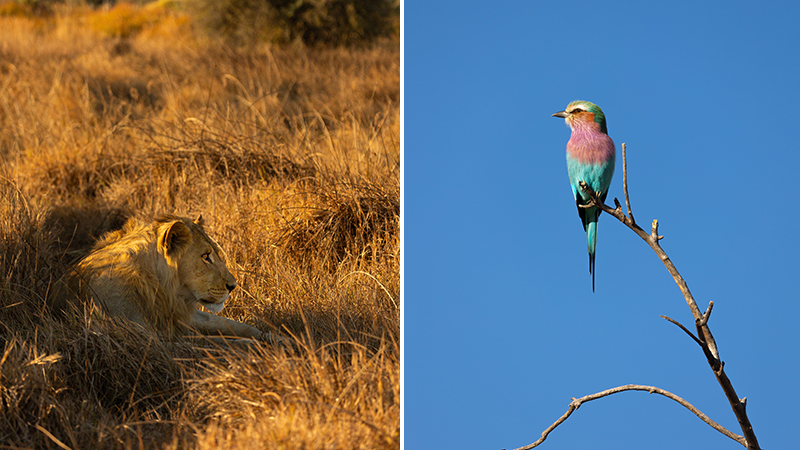
With only one hour of daylight remaining, we sped through the park toward our first campsite. The warm glow of the setting sun bathed the landscape in a soft golden hue. In the distance, another cruiser of tourists was parked against a tree line, just past them, a breeding herd of elephants, their ears waving as they fed on leaves and the wintertime vegetation. As we drew closer, the other group began to back away, meeting us on the road. Our guides exchanged words in Setswana, the national language of Botswana. My eyes attempted to follow their pointing fingers, but I could not discern what seemed to be the topic of discussion. As the other guide pulled away, Okwa angled our cruiser into the tall grass lining the dirt road. The rustle of reeds filled the air as our vehicle climbed over the uneven terrain, completely engulfed by the monstrous grasses, the Cruiser’s suspension creaking as we rocked back and forth. Within 30 seconds we were seated just outside of the elephant herd, watching the calves and cows as they shot glances our way. Before I could raise my camera, a flash of movement caught the attention of everyone in the car. Sprawled in the shade were two young male lions. Their manes sprouting around their neck, they lifted their heads to catch our scent. No more than 15 yards away, they sat calmly, cleaning their paws and staring into the evening sun. For the next hour we sat and watched, lions to my left and elephants to my right. For a moment the weight of the world washed over me and came to rest as a heavy weight in my chest. It was at this time that the magnitude of my experience sank in, this mix of emotions nestled deep within my soul. A fusion of joy, wonder, and extreme gratitude. At twenty years old I was living my childhood dream. With a southern wind pressing against my face, I couldn’t help but to quietly declare this was "one of the best days of my entire life."
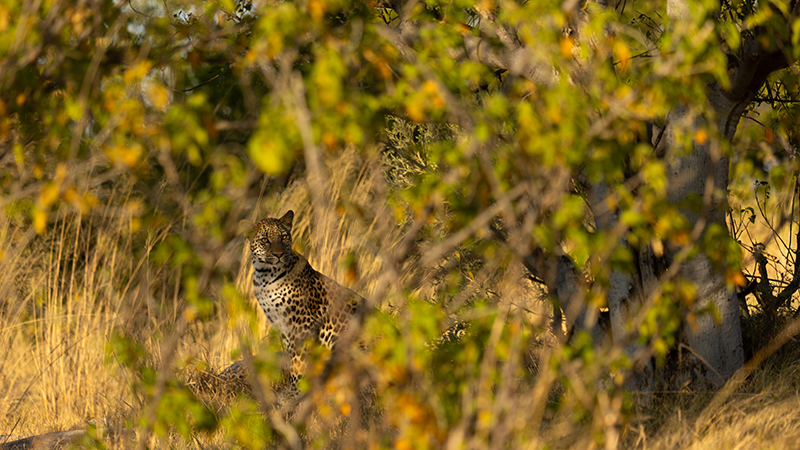
The more time I spent in the Delta the more connected I became to the rhythm of the world, a heartbeat of living things connected across the landscape. We started to merge into this dance, directed by the sun and stars, until we too felt familiar. Each day we rose with the sun, surrounded by living things. An overwhelming amount of biodiversity was uncovered each day, yet as the sun set and the stars took its place, moments for reflection allowed me to connect with it all. Over time the various parts of the Delta became recognizable. We explored Moremi Game Reserve to view some of the most spectacular wildlife in the world, next Kazakini Communal Conservancy where we walked alongside elephants and encountered lions on foot, and finally we traveled north to Tsodilo Hills to visit the oldest evidence of Homo Sapiens. Northern Botswana quickly became the most fantastic place I had ever visited. Here I stood 8,000 miles from my home, walking through the wildest landscape I had ever seen, and sleeping under the stars where humanity itself originated. It is in moments like this I often try to calculate the impact of it all.
At night I would lie awake, listening as elephants grazed near my tent. My thoughts would be accompanied by a backdrop of snaps as curious trunks invaded the tree canopies searching for a late-night snack. By moonlight, I watched as elephant infants chased their moms, trunks probing the night, ears creating their own gentle breeze. Sitting on top of my sleeping bag, these ghosts brought tears to my eyes.
For years I had chased a dream of experiencing Africa, now I had nearly four months to absorb as much as possible. What people often referenced as experiences of a lifetime, I hoped to turn into a lifetime of experiences. This quest for worldly exposure brought me not only technical skills in the field of conservation but an education of my own being as well.
Throughout my time in Botswana, I gained a well-rounded view of myself, my perspectives, and my aspirations for the future. Surrounded by professionals in the field I hoped to pursue, I asked questions and learned more than I could ever take home. It is moments like these that shape me as a learner and a human being. Experiential learning has become extremely important to my collegiate career, and I hope to take this knowledge with me as I move forward.
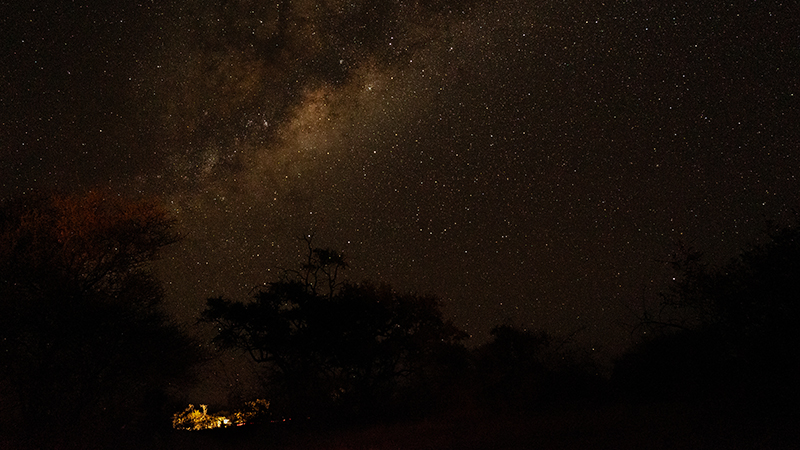
For two weeks I was enveloped by the warmth of the Okavango. Its waterways the arteries to a beating heart of life. A heart that consisted of thousands of organisms living together in an ecosystem unlike any other. People living alongside elephants, hippos and crocodiles. Surviving in a world filled by water. Surrounded by the Kalahari Desert. I now understood why this place was so special. There was a depth to the Delta I had underestimated completely.
As I write this, propped at my desk in Hardin Hall, I am surrounded by familiar faces. Ones that have accompanied me through the past three years of my education at the University of Nebraska. Within these classrooms I have learned lots. I have recited formulas and worked my way through a multitude of curriculums and courses. And though this time has been integral to my development it is the moments in the field that have stuck with me the most. My time in the Delta shaped a part of me that I hope to never lose. It was during my visit that I experienced a world much bigger than my own. I gained perspectives whose roots reach further in history than could ever be recorded. Through conversations with Okwa, his friends, and colleagues, I began to understand the connection their families have with the Okavango. I learned their stories and explored their life experiences. I had the privilege to spend time with a multitude of professionals in the field of natural resources. Their advice, conversations, and impact, have already shaped my aspirations for the future. It is through these connections I have realized the impact of conservation work, and solidified my decision to pursue a career in natural resources. Finally, I have learned so much about myself. From the time I spent navigating crowded bus ranks, to the evenings watching elephants browse beside my tent. These moments have taught me lessons in kindness, collaboration, and curiosity.
The three weeks I spent in Botswana have made a lasting impact on me and there is not a day where it has not crossed my mind. Many nights have been spent scouring my journal, trying to relive this experience. Each time I open its leatherbound cover, I come back to the same entry, over and over again. Composed on my last night in the Delta it reads:
As the sun sets in the Okavango, every atom glows with golden light. This place radiates an energy that is impossible to articulate, yet so easy to understand. It can never be caged, a wild like no other. Giraffes break these golden beams and lechwe bound through its gleaming glow, ready to remind us that we are simply guests amongst the grasses, bearing witness to this world.
